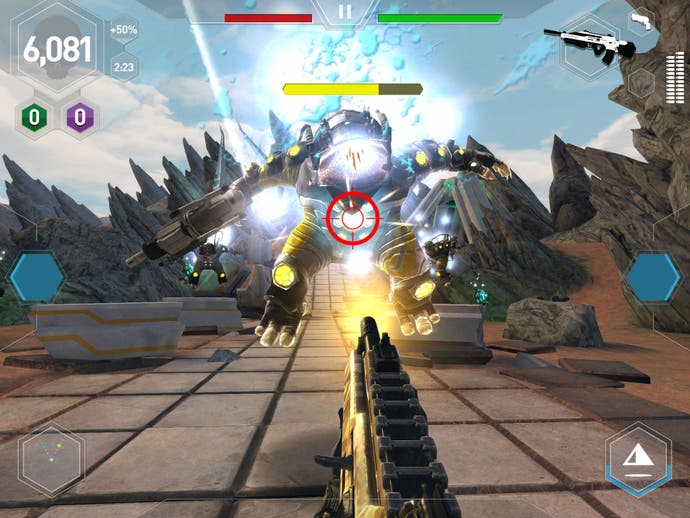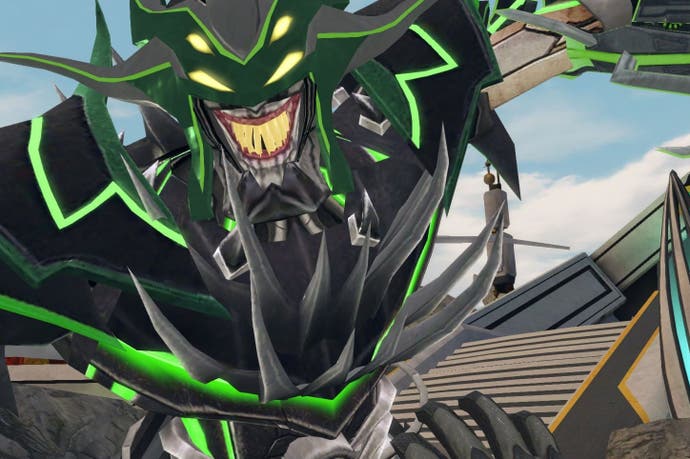How is the other new shooter from the creators of Halo?
Midnight Star tackles the same challenges as Destiny on a different platform.
Midnight Star isn't Halo on a tablet, but it plays a lot like it. You'll find yourself playing from a first-person view, shooting squat, comical aliens in the shadow of grand alien architecture, and you'll hear your efforts rewarded with shout-outs from a gruff American commentator: 'Double-kill', 'Triple-kill', 'Titanikill', 'Killzilla'.
More importantly, it's got the snap and fizz of Halo's arsenal transposed to a touchscreen - there's a tangible sense of weight as you drag the guns around the screen, a meaty boom when you pull the trigger of a shotgun and crunchy feedback when you headshot one of the bespectacled space-toads that serve as Midnight Star's grunts.
All of which makes perfect sense when you learn that Midnight Star is the debut game from Industrial Toys, a studio set up by Alex Seropian, one of the founders of Bungie, and its design lead is Paul Bertone, someone who filled that same role on Halo 2 before becoming lead mission designer on Halo 3. This is a game with enviable heritage.
It's also one that's benefited from an enviable time in production, by mobile standards at least. You might, if your memory's sharp enough, remember Industrial Toys from when its formation was first announced at the start of 2012. It's been working on Midnight Star ever since.
"Well, we were aiming for a 2012 release," Seropian jokes over Skype. "Wait, is it 2015 now? What took so long!"
The answer, as art director Aaron Marroquin explains, is simply down to the moving goal-posts that come when developing for a platform that's constantly evolving. "During production we had the 4S, the 4 and the iPad 3. Then the 5 came out and we had to change the UI, and it impacted the layouts of the level, how far you can see left and right. As far as graphics go, a lot of the team hadn't developed for older consoles, like how you'd do that now - so we had to try and build next-gen content, but the way you'd do it for PlayStation 2."
"We got the game playable, with the controls that we have in there now, a while ago, so the fundamental core mechanics of the game have been working for quite a while," adds Seropian. "What we've spent most of the last year doing is polishing all the content, and putting in all the systems that we have so we can build a community. The challenge system, our events system, all the trophies - we've got live leaderboards that we set every day, every week, every month, that hopefully will give people the incentive to play together. All of that, it takes a long time. It's the first time we've built that stuff on mobile."
As you'd expect from a game that's spent so long in gestation, Midnight Star is a polished affair, and one that, in its minute-to-minute action, is very pleasing to play. You swoop your sights around a screen that remains largely static, though you'll be ushered from set-piece to set-piece, and there's the ability to shift your view from left to right to deal with the ever escalating hordes. You can zoom in by pinching the screen, firing off headshots with satisfying ease, pausing briefly to reload or tapping the screen when the enemy gets too close to deliver a melee kill. Levels are short - they take two to three minutes to see through to the end, and checkpoints are typically around 30 seconds apart - all of which speaks to how it's been tailored for portable play.
The core, then, works well. Beyond that, are systems that also speak to its platform, with new guns being activated after a timer and a tangle of currencies that feed into upgrades and unlocks. There are in-app purchases, too - this is, after all, a free-to-play game - and at present you're funnelled toward them at most given opportunities. This is a shooter that's playing for a core audience, yet at present it's leaning very heavily on the one thing that audience vocally detests.
"We're very much aware of that," sats Seropian. "We're looking at what other people have done in games that have been successful. We want to give players a sense of ownership on what they're getting - so we focussed on gear and weapons and giving them choice with what kind of style they want to play with. It's interesting the way our weapons work - it's sort of like playing a different character, because the personality of those guns is so different. If you find something you like - and you don't have to pay - if you want to double down on something that's your choice. I feel pretty good about how the in-app purchases work. There's some free-to-play games you play and you get that obvious sense that this game is like a slot machine, a money machine. We tried to turn it around the other way. If you're into it, you want to pay for more of what you like, the opportunity is there."

What's fascinating about Midnight Star right now is how it so often feels like a Destiny that's come from a parallel universe: whereas Bungie layered on MMO traits to the trusty Halo formula, with varying degrees of success, Industrial Toys has taken that foundation and filtered it down for a mobile platform. "Our focus is really on building a community around a game - which is similar," says Seropian. "We want to build something that's going to last for a while. That's our goal with this game. We see so many experiences on mobile being disposable, and we wanted to make something that people can play for a long time, that they can make friends or enemies in."
Whether it's as successful or not remains to be seen, and while the fundamentals of the game are sound there's a question mark about how many people who love playing shooting games are willing to look for that experience on a mobile platform. There are games out there that cater to that crowd - Seropian points to Vainglory, the deep and fully featured MOBA from Super Evil Megacorp that's proving a success - but, if given the opportunity to start again in 2015, would Industrial Toys still commit to a mobile platform for its shooter?
"Absolutely I would do the same thing again," Serpoian exclaims. "The word mobile has a lot of connotations and baggage that comes with it. The digital handheld ubiquitous device, it's just so awesome. We released our game a couple of days ago, and there are people playing all over the world. It's so accessible, and the distribution mechanic is so accessible. The device itself is a communication device, it's not just a game player. There's so much about the device that's interesting and with possibilities for creating experiences.
"You asked a specific question about whether I'd start the same business again, it's still such a great business opportunity, and with so much blue ocean left to explore. In the console space, everyone's trying to make a core game, and a lot of people are trying to make shooters. Everybody who's got a console also has a phone - and they're so under-served. They need content! I need content on my iPad, on my phone. It's such a juicy opportunity. You asked would I start the business again? Yeah! Would I double down on the existing business! Yes, that's exactly what we're doing."


